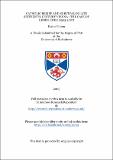Files in this item
Catholic belief and survival in late sixteenth-century Vienna : the case of Georg Eder (1523-1587)
Item metadata
| dc.contributor.advisor | Gordon, Bruce | |
| dc.contributor.author | Fulton, Elaine | |
| dc.coverage.spatial | 323 p. | en_US |
| dc.date.accessioned | 2018-05-30T12:08:19Z | |
| dc.date.available | 2018-05-30T12:08:19Z | |
| dc.date.issued | 2003 | |
| dc.identifier.uri | https://hdl.handle.net/10023/13615 | |
| dc.description.abstract | This thesis is a detailed study of the religious belief and survival of one of the most prominent figures of late sixteenth-century Vienna, Georg Eder (1523- 1587). Eder held a number of high positions at Vienna University and the city's Habsburg court between 1552 and 1584, but his increasingly uncompromising Catholicism placed him at odds with many influential figures around him, not least the confessionally moderate Habsburg Emperor Maximilian II. Pivoted around an incident in 1573, when Eder's ferocious polemic, Evangelische Inquisition, fell under Imperial condemnation, the thesis investigates three key aspects of Eder's life. It examines Eder's position as a Catholic in the Vienna of his day; the public expression of this Catholicism and the strong Jesuit influence on the same; and Eder's rescue and subsequent survival as a lay advocate of Catholic reform, largely through the protection of the Habsburgs' rivals, the Wittelsbach Dukes of Bavaria. Based on a wide variety of printed and manuscript material, this thesis contributes to existing historiography on two levels. On one, it is a reconstruction of the career of one of Vienna's most prominent yet under-studied figures, in a period when the city itself was one of Europe's most politically and religiously significant. In a broader sense, however, this study also adds to the wider canon of Reformation history. It re-examines the nature and extent of Catholicism at the Viermese court in the latter half of the sixteenth century. It highlights the growing role of Eder's Wittelsbach patrons as defenders of Catholicism, even beyond their own Bavarian borders. The thesis also emphasises the role, potential and realised, of influential laity such as Eder in advancing the cause of Catholic reform in the late sixteenth century. Thus it is a strong challenge to the existing, prevalent portrayal of the sixteenth-century Catholic laity as an anonymous and largely passive group who merely responded to the ministries of others. | en_US |
| dc.language.iso | en | en_US |
| dc.publisher | University of St Andrews | |
| dc.subject.lcc | BX1522.V5F9 | |
| dc.subject.lcsh | Eder, Georg, 1523-1587 | |
| dc.subject.lcsh | Catholic Church--Austria--Vienna--History--16th century | en |
| dc.subject.lcsh | Vienna (Austria)--Church history--16th century | en |
| dc.title | Catholic belief and survival in late sixteenth-century Vienna : the case of Georg Eder (1523-1587) | en_US |
| dc.type | Thesis | en_US |
| dc.contributor.sponsor | Caledonian Research Foundation | en_US |
| dc.contributor.sponsor | Carnegie Trust for the Universities of Scotland | en_US |
| dc.type.qualificationlevel | Doctoral | en_US |
| dc.type.qualificationname | PhD Doctor of Philosophy | en_US |
| dc.publisher.institution | The University of St Andrews | en_US |
This item appears in the following Collection(s)
Items in the St Andrews Research Repository are protected by copyright, with all rights reserved, unless otherwise indicated.

